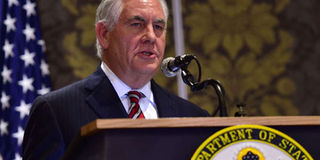In Tillerson saga, the more things change, the more they remain the same

U.S. Secretary of State Rex Tillerson speaks during a joint press conference with Kenya's Foreign Affairs Cabinet Secretary Monica Juma (not in frame) on March 9, 2018 in Nairobi. PHOTO | TONY KARUMBA | AFP
What you need to know:
- Some have argued that Tillerson was on a mission to placate Africans after recent apparently derogatory remarks by Trump.
- Security and economics were top on Tillerson’s agenda rather than international camaraderie.
It is one of the dramas of US foreign policy towards Africa and the world that former US Secretary of State Rex Tillerson was fired as he concluded his first trip to Africa.
Tillerson is being replaced by former Central Intelligence Agency Director Mike Pompeo, the choice of the country’s chief spy as the new foremost diplomat is fuelling innuendo.
While these developments are resplendent with juicy narrative, they should not distract us from analysing the stable and connecting threads of US diplomacy towards Africa.
The change in secretaries of state in the US does not change much of US foreign policy in Africa.
OBAMA VISIT
Tillerson’s trip was the first visit by the equivalent of a foreign minister nearly 14 months since the swearing-in of President Donald John Trump as the 45th President of “the most powerful nation on earth”.
By contrast, no less than former president Barack Obama came six months after inauguration in 2009, and, on the Egyptian leg of that trip, was accompanied by former secretary of state Hillary Clinton.
This is evidence in the hiatus between the Obama and the Trump administrations as far as Africa is concerned.
In other words, Africa remains very low on Trump’s global diplomacy agenda.
Observers however miss a crucial point when they dismiss the current US foreign policy and practice on Africa in blanket version.
In varying magnitude, there is no shortage of economic, cultural and political justifications to uphold the fact that America won’t simply walk away from Africa as it pursues the "America First" agenda.
COLD WAR
In a manner of speaking, it is a matter of, “the more things change, the more they stay the same”.
As a great power, the US has always seen Africa as theatre for projection of its global front print vis-à-vis competitors, principally, Russia and China.
In the Cold War era, the continent was the ground for the ideological battle pitting America-led capitalism against Russia-China led socialism-communism.
The reality of the continuation of this power play was palpable in Tillerson’s visit, and it’s one that Mike Pompeo is likely to nourish and sustain.
Tillerson lay into China accusing the oriental competitor of a resource grab and therefore a form of neo-colonialism in Africa.
Interestingly, the US ceded ground on trade volume prominence in Africa to China in 2009 although the US remains a leading donor-nation to the continent (save for the anticipated cuts).
One can expect Pompeo to strum these same chords when he comments on Africa.
RUSSIA
A curious coincidence is that Tillerson was on the continent at the same time as his Russian counterpart Sergei Lavrov, their paths intersecting in Addis.
Conspiracy theory would have it that the coincidence is a calculated one rather than being innocent.
It is however notable that Tillerson’s visit has been covered much more by African press than Lavrov’s indicating that the balance of power in Africa is in favour of the US rather than Russia.
Nonetheless, the criss-crossing of the US and Russian chief diplomats sustains the fact that Africa remains their geopolitical stomping grounds on the back of the continent’s human and natural resource endowments.
TRUMP INSULT
Some have argued that Tillerson was on a mission to placate Africans after recent apparently derogatory remarks by Trump on Africa as a s***hole place.
Fence-mending may have been one of the trip’s objectives, but generally, massaging the feelings of Africans bewildered by Trump’s slur is a minor point.
A realistic reading would have to start with consideration of the African nations that Tillerson visited: Chad, Djibouti, Ethiopia, Kenya and Nigeria.
All these nations are beset with terrorism-inspired violence that threatens US interests.
Thus, security and economics were top on Tillerson’s agenda rather than international camaraderie.
As far as Africa is concerned, Pompeo will continue with the same script.
The writer is a lecturer at University of the Witwatersrand, South Africa, [email protected]




